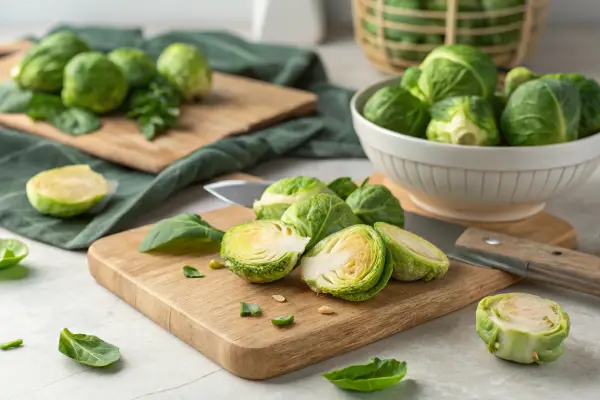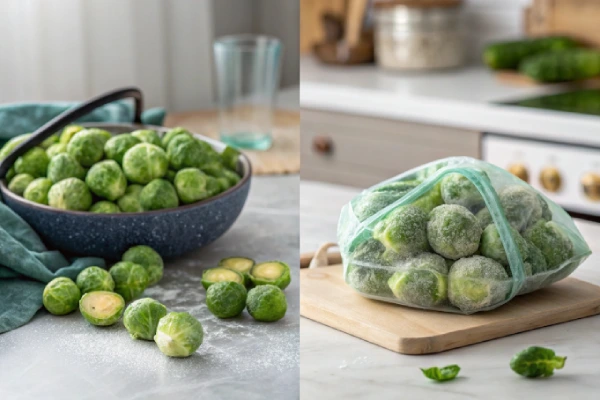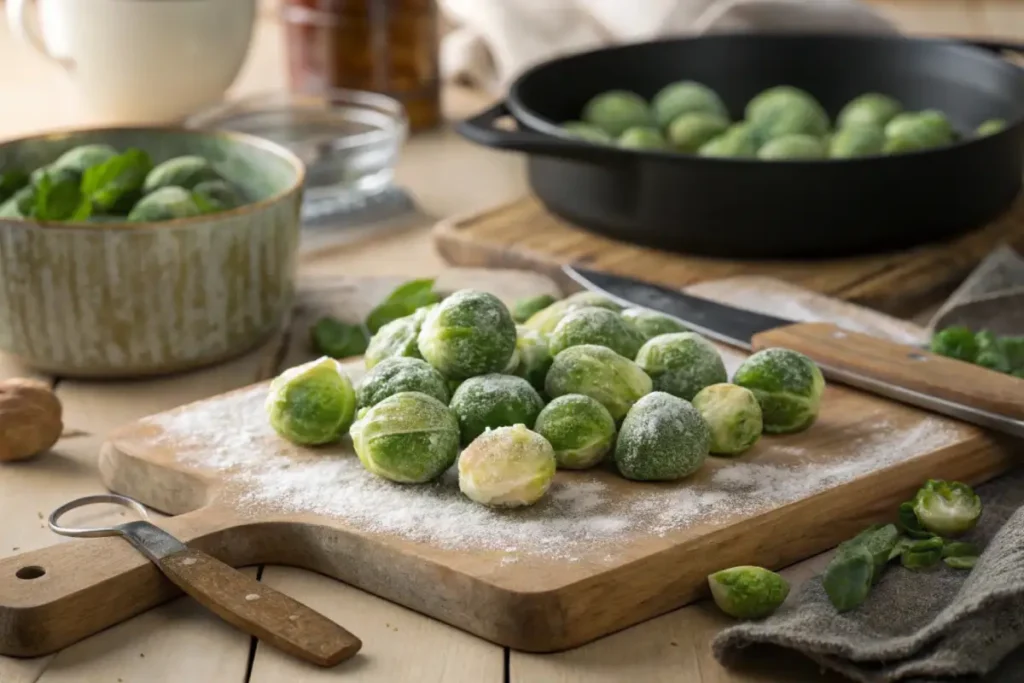Table Of Contents
Table of Contents
Introduction
Brussels sprouts are a potent vegetable that is loved by many for their variety, delicious flavor, and high nutritional value. When they are cooked to perfection, added to salads, or incorporated into soups, these small crudites can complement a variety of dishes. Are frozen Brussels sprouts as good as fresh? This debate continues to be a hot topic in kitchens across the world.
Can frozen Brussels sprouts be the same as fresh ones? The answer isn’t black or white, but it depends on a variety of aspects like taste preferences and nutrition, cooking techniques, and even convenience. In this thorough guide, we’ll explore the distinctions between frozen and fresh alternatives and explain their similarities, differences, and the best ways to use them.
Fresh Brussels Sprouts: The Gold Standard

Fresh Brussels sprouts are often the place in the world of food. Their vibrant appearance, fresh texture, and nutrient profile make them an ideal option for foodies.
Appearance and Texture of Fresh Brussels Sprouts
The first thing you’ll observe in freshly harvested Brussels sprouts is the bright green hue. They’re firm to the feel and have tightly packed leaves that signal their freshness. Their firm texture makes them a perfect ingredient in salads and dishes that require a crunch. vital.
- Visual Appeal The fresh sprouts appear delicious and can enhance the look of your meals.
- Perfect Texture: Their firmness provides an enjoyable crunch, particularly when they are grilled or roasted.
Nutritional Value of Fresh Brussels Sprouts
Fresh Brussels sprouts are high in nutrients which provide the highest health benefits. What makes them so important:
- It is rich in Vitamin C: This antioxidant boosts immunity, increases collagen production, and boosts the health of your skin.
- The high content of fiber: Supports digestion and ensures the health of your gut.
- Vitamin K is Vital for bone strength and for proper blood clotting.
- Antioxidants fight oxidative stress and reduce the risk of developing chronic diseases.
Freshly eaten, Brussels sprouts maintain their complete nutrient profile, which makes them an ideal food.
Taste and Flavor of Fresh Brussels Sprouts
Fresh Brussels sprouts possess a distinct sweet and nutty taste when cooked properly. They’re extremely flexible and can be cooked in many ways depending on your personal preferences. However, overcooking could cause a sulfur-like smell and bitter taste which is a common occurrence for those who are new to cooking.
Shelf Life of Fresh Brussels Sprouts
The most significant drawback with freshly picked Brussels sprouts lies in their short shelf duration. They usually last for about 3-5 days after being refrigerated. In the following days, they could be swollen, lose flavor, or form spots, which makes the product less desirable and more difficult to work with.
Frozen Brussels Sprouts: The Convenient Alternative
Frozen Brussels sprouts can be a lifesaver for people who are busy cooking and shopping. They are frozen in flash at the peak of their ripeness, and they keep a lot in their nutrition as well as flavor.
How Freezing Preserves Brussels Sprouts
The process of freezing involves the harvesting of Brussels sprouts right at the peak of maturity, then blanching them to block enzyme activity, and then freezing them quickly. This assists in:
- Block in Nutrients The process of freezing retains many of its vitamins as well as minerals.
- Extend Shelf Life The frozen Brussels sprouts can last for up to a whole year which reduces food consumption.
- It is convenient: They are pre-washed cut, trimmed and all set to go.
Texture of Frozen Brussels Sprouts
The process of freezing can alter the texture of Brussels sprouts. After cooking, the frozen sprouts tend to be less firm than fresh ones. Although this may not be appealing to everyone, it does work particularly great in stews, soups, and casseroles.
Cooking Techniques for Both Types
Preparing Frozen Brussels Sprouts
Making frozen Brussels sprouts can be simple and satisfying. A method that works is to use an air fryer that gives crisp and tasty outcomes. For a comprehensive guide to the method, including the recipes, preparation steps, ideas for seasoning, and cooking times look up how to make frozen Brussels Sprouts Crispy with the Air Fryer. This article provides useful tips for improving your culinary experience when using freezing Brussels sprouts.
Flavor of Frozen Brussels Sprouts
The frozen Brussels sprouts keep their nutty flavor, but the taste might be milder than fresh sprouts. A proper seasoning using ingredients such as olive oil, garlic, and other spices can enhance the flavor of Brussels sprouts significantly.
Cost-Effectiveness and Availability
Frosted Brussels sprouts are less expensive than fresh sprouts, which makes the perfect choice for families and individuals who are on a tight budget. Furthermore, they are readily accessible all year long unlike fresh sprouts that are usually only plentiful in certain seasons.
Comparing Fresh and Frozen Brussels Sprouts
To decide which is the best for your requirements Let’s look at both frozen and fresh Brussels sprouts across a variety of categories.
Nutrition Face-Off: Fresh vs. Frozen

Both frozen and fresh Brussels sprouts are full of nutrients However, there are some slight differences:
- fresh: They retain all of their nutrients when consumed right after harvest. However, their nutritional value decreases as storage time increases.
- Frosted The nutrients are lost while blanching, but keep their nutrition value for months as a result of the freezing.
Taste and Texture Comparison
- New: Crisp texture with strong flavor if cooked properly.
- Frosted: Softer texture and slightly softer flavor, which makes them suitable for cooked or blended meals.
Ease of Use
- New: Require washing, trimming, and prepping before cooking.
- Frozen Pre-washed, pre-trimmed, and cleaned, reducing the time as well as effort.
Affordability and Accessibility
- “Fresh: More expensive, particularly outside peak seasons.
- Frost: Budget-friendly and available throughout the year.
Best Uses for Fresh and Frozen Brussels Sprouts
The decision to choose between fresh and frozen is based on the type of dish you’re making.
Ideal Uses for Fresh Brussels Sprouts
- Salads Slice raw sprouts thinly to make crisp salads.
- roasting Grill with salt, olive oil, and pepper to make a delicious food side dish.
- Grilling Grill them to enhance their natural sweetness.
Best Applications for Frozen Brussels Sprouts
- Stews and soups: Use them in blended recipes where texture isn’t as important.
- Casseroles: Incorporate them into baked dishes when you want softness.
- Quick Stir-Fries can be added to the mix for quick and nutritious meals.
Tips for Buying and Storing Brussels Sprouts
For Fresh Brussels Sprouts:
- Seek out clear green heads without spots or yellowing.
- Select smaller sprouts for a sweeter taste.
- Place sprouts that are not washed in a bag with a perforated opening inside the refrigerator.
For Frozen Brussels Sprouts:
- Make sure to choose reputable brands that have no preservatives or additives.
- Avoid bags that have excessive frost, since it could signal freezing burn.
- Place in the freezer as soon as possible following the purchase.
How to Cook Brussels Sprouts for Maximum Flavor
Roasting for Crispiness
Roasting is among the most effective ways to reveal the delicious taste that is the hallmark of Brussels sprouts. Mix the sprouts, whether frozen or fresh with salt, olive oil, and pepper, then roast by baking at 400 degrees F (200 degrees C) until they are golden brown.
Steaming for Nutrition
Steaming is a great way to retain nutrients and make the sprouts more soft. You can add an ounce of lemon juice or sprinkle Parmesan cheese for a more flavorful addition.
Sauteing for Quick Meals
Sauté sprouts and garlic with bacon, or onions in a skillet for an easy and tasty food item.
FAQs About Frozen and Fresh Brussels Sprouts
Do Frozen Brussels Sprouts Lose Nutrients?
However, they can retain a lot of their nutrients because of the freezing process, but with only a small amount lost in the process of blanching.
Can I Use Frozen Brussels Sprouts in Salads?
Although they are it is possible, frozen sprouts can be more delicate and suited to cooked meals than raw salads.
How Do I Avoid Bitterness in Brussels Sprouts?
The high heat of roasting or using sweeteners such as balsamic vinegar or honey will lessen bitterness.
Can You Freeze Fresh Brussels Sprouts at Home?
Yes, they should be blanched just a bit before freezing them to keep their texture, color, and nutrients.
Conclusion: Fresh or Frozen – Which is Best?
Fresh and frozen Brussels sprouts are a great choice because of their unique advantages. Fresh sprouts are a great option for meals in which texture and taste are essential. But, sprouts frozen provides unparalleled convenience, cost-effectiveness, and availability all year round.
The final decision will depend on your personal preferences as well as your cooking style and your time limitations. If you choose to use frozen or fresh, adding Brussels sprouts to your meals is an excellent choice to improve your health and your taste buds!



